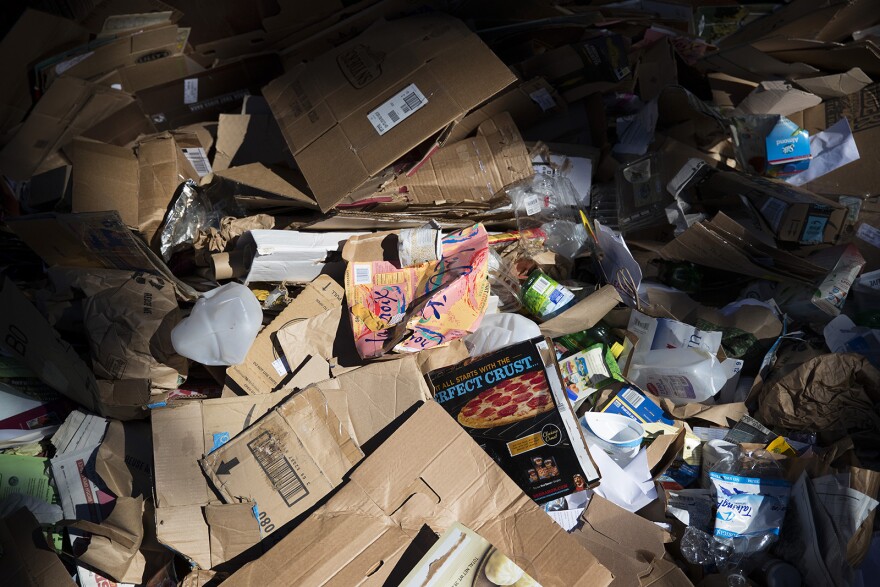With China no longer importing many recyclable materials, recycling programs up and down the West Coast are in turmoil.
Twenty-two cities in western Washington have started sending some perfectly good recyclables to the dump. Seattle and Tacoma have bucked the trend: Their waste-collection contractors continue to find markets for residents’ old paper, metal and plastic.
“If you’re putting things in the recycle bins in Seattle, they are being recycled,” Becca Fong with Seattle Public Utilities said.
“We haven’t landfilled anything to date,” said Shane Pettit of Tacoma Solid Waste Management. “But the impacts are very real.”
Pettit said Tacoma went from receiving $12 to $18 a ton last year for its commingled recycling—the undifferentiated mix that many urban residents can plunk into one recycling bin—to paying $85 to $92 a ton to have it taken off their hands.
“Everybody is feeling it,” said Alli Kingfisher of the Washington Department of Ecology. “Everybody is struggling to find markets for where those materials can go.”
“This is a problem that’s not going away,” said Michael May of Bellevue Utilities.
The problem began when China, the world's largest manufacturer and the largest importer of recyclables, announced last July that it was banning imports of 24 types of solid waste and recyclables.
Since then, China has cracked down further on what its government has called “foreign garbage smuggling.”
It has banned imports of recyclables with more than 0.5 percent contaminants.
Recycling operations typically have 3 to 5 percent contaminants such as food residue, moisture or the wrong kind of plastic, according to the Washington Refuse & Recycling Association, which calls China’s standard “all but unachievable.”
China has even sent inspectors to Tacoma’s Pioneer Recycling facility to inspect and reject contaminated bales of paper, metal and plastic, according to Kingfisher. Resource Recycling magazine reported Tuesday that China now requires these time-consuming inspections for every load of recycling to be exported to China.
This spring, Republic Services, the Fortune 500 company that holds recycling contracts with dozens of local governments in Washington, asked the cities for permission to start throwing out the mixed paper piling up at its sorting facilities.
Cities including Bellevue, Kent, Mercer Island, Monroe, Renton and Sammamish agreed to landfilling material that residents had separated and put out for recycling.
“Our customers expect that the materials they separate will be diverted from the landfill and reused as a resource,” Bellevue officials told Republic in approving a temporary retreat from recycling. “It is of utmost importance to the city that our customers’ trust is not violated.”
May said “maybe half” the paper gathered for recycling in Bellevue is now being thrown away. Still, he encouraged residents to keep recycling.
“Yes, that’s a terrible thing that a lot of it’s being landfilled, but a lot of it’s still being recycled,” May said.
“We’re pivoting to other markets,” Jennifer Eldridge with Republic Services said. “Malaysia, Vietnam.”
Hans Van Dusen, who manages recycling contracts for Seattle Public Utilities, said it is very hard to predict what the Chinese government will do next. Even so, Van Dusen said the market for old paper should bounce back — at some point.
“There’s continued demand for that commodity,” he said. “People need to make packaging: They need the commodity of pulp. That hasn’t gone away at all.”
Paper has been especially difficult for recyclers in the Northwest, where precipitation can quickly eat into its value.
“A bale of paper can sit out at a recycling facility in Arizona a lot longer than it can sit out and wait to be shipped in Seattle because of the damp air,” Eldridge said.
Republic’s recycling facility in Seattle’s SoDo neighborhood has a roof. “But we have big huge doors open during operating hours, for trucks going in and out,” Eldridge said. “On a rainy, drizzly day, even under cover, there’s a lot of moisture in the air.”
Recycling officials urge consumers to make sure they only put out items that are clean, dry and empty.
With even a small amount of moisture or the wrong material potentially contaminating an entire load of recyclables, they urge residents to avoid “wishful recycling” of objects they think or hope should have a second life.
Hence the recycling mantra: When in doubt, find out, or throw it out.
“Washingtonians, we are very passionate about recycling,” Kingfisher said.
But, as waste managers have been saying for decades: If you really want to have less impact, try to generate less garbage in the first place.
“Recycling is not the first step that we should be taking,” Kingfisher said. “We as consumers should really be focusing upstream on how can we reduce and reuse the amount of materials that we're using in the first place.”


